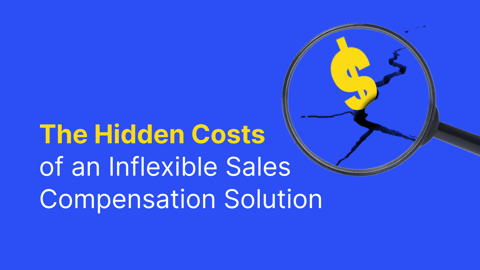Let’s start this blog by posing an important question: do you and your management team really know how your business’ Incentive Compensation Management (ICM) scheme works?
Whether the answer is yes or no, the follow-up to that is: do you and your team have faith and trust in it? Tough stuff to ponder, especially if you’re reading this in the morning before your first caffeine hit.
So, take a sip of your coffee and consider this. If there’s any shadow of a doubt concerning transparency and fairness, or if you have even the vaguest sense that the sales executives that report to you are feeling demotivated because of a possibly inaccurate or unbalanced compensation structure, then maybe it’s time to overhaul your current system and find a solution that meets these needs.
- Why Sales Commission Management Matters
- What is the Ideal Compensation Model for a Business?
- Common Compensation Management Issues
- Sales Commissions Software and Compensation Management Software - What's the Difference?
- What Your Sales Compensation Management Software Should Provide
- Buying Incentive Compensation Management Software: Your Critical Success Factors
- Benefits of Using Incentive Compensation Management Software
Why Sales Commission Management Matters
This might seem a strange question to ask, but how a company manages its sales incentive plans can impact its continued success. After all, don’t all incentive models work equally well? The answer isn’t yes necessarily – there are plenty of pitfalls to catch out the unwary.
Some might think that what's always worked in the past will still work in the future. But, in a rapidly changing world, it’s easy to have incentive programs in place that are no longer competitive or don’t recognize that customers now make their decisions differently or like to buy through new channels.
What is the Ideal Compensation Model for a Business?
While the needs of every business will always be unique, there’ll be common themes that a company's leadership will need to have in place if they’re to continue being successful. Managing incentive compensation needs careful thought.
Taking a systematic approach that ensures all the key elements of an effective incentive program are captured and understood will maximize the chances of success. Perhaps not surprisingly, given the importance of getting this right, and the complexity of many Go-To-Market strategies, many companies are reducing their dependence on their old spreadsheet-based incentive management models and are looking to use incentive compensation management software applications.
Common Compensation Management Issues
Before imparting the good news of how to make almost all your current commission issues go away, let’s take a closer look at what may be misfiring right now.
If your business is either using a ton of different compensation processes built on unreliable legacy systems or relying on manual inputting, you’re likely exposed to the toxic fallout that results from inaccurate reporting, inaccurate pay-outs, and ultimately, dissatisfied sales employees. The most common and lethal problems are:
Legacy Systems
This is a catch-all phrase for anything that’s unreliable, slightly historic, and can chalk up more failures than successes when being graded. In the context of compensation payments, that means there may well be more than one commission scheme, even in a single team, and the all-important information that determines what someone will receive could easily be calculated incorrectly if there are any manual processes involved. And when that occurs, it leads to…
Shadow Accounting
When there’s a shadow of a doubt, shadow accounting will follow. Your high-performing sales team will be quick to spot any underpayments on their sales commission statements and therefore get into a regular habit of doing their own sums. This undermines the work of your compensation administrators, takes the focus off selling, and can create a palpable sense of mistrust across your organization.
Discover more about shadow accounting and how to stop it here.
Unhappy Stakeholders and More Auditing/Compliance Checks
When the books aren’t balancing, that type of worrying news will reach the boardroom in a nanosecond. And that’ll have repercussions. Hand in hand with that potential bomb going off will be further intervention and scrutiny from auditors. Trying to gather the evidence when the numbers are coming at you from all sides and all sources makes your job and their job harder, longer, and more costly. And more invasive, especially if they’re external auditors.
Sales Commissions Software and Compensation Management Software - What's the Difference?
There are significant differences between sales commission software and incentive compensation management software. Sales commission software focuses on designing commission models that can help a sales manager track who gets what based on what business a salesperson closes.
Incentive compensation management software takes that to the next level by looking at the complete compensation package, including base compensation packages, as well as other incentive models, covering bonuses, one-off incentives, and non-financial incentives. ICM models can provide near-real-time reports for salespeople and their managers alike so it’s clear how people are performing and how they’ve been paid year-to-date.
What Your Sales Compensation Management Software Should Provide
We cover this issue in more detail in this article, but this should be your essential shopping list:
1. Easy to Use, Easy to Understand
Good looks can only get you so far, so check that the interface lives up to its description. Make sure your team can access the data fields that matter to them and know how to get to the reports that can offer a real-time picture of their performance and performance against their quota target.
2. Integration Capabilities
In short, can you access relevant dashboards and reports on quotas, territories, and sales pipelines? Moving to a single platform solution means you’re no longer viewing these things in isolation. When seen as different moving parts of the same platform, remuneration quickly becomes easier and fairer.
3. Surfacing Issues and Building Solutions
As well as ensuring the top performers are being justly rewarded, you’ll want the ability to detect underperformers – whether that’s an individual or a team of fifty covering a territory. And once you have that information, you want to know “why,” not just who and when. Real-time updates allow you to stay on top of every salesperson and situation.
4. Value-rich Data and Functions
On the flip side of current data, understanding the historical context is also a must, especially when finalizing commission or setting performance reviews and objectives. Check that whatever sales commission software system you’re investing in offers this functionality, plus the ability for the sales rep to post their own queries.
5. ‘What if’ Scenario Planning
For a sales management team looking to be successful, potentially the greatest value of the incentive compensation management software is its ability to generate several options for possible commission models. This enables them to see which model offers the best outcome for the business based on quota models and market opportunities.
Buying Incentive Compensation Management Software: Your Critical Success Factors
Not all incentive compensation management software solutions are created equal. While some platforms automate the management of sales commission only, for many companies, this offers little progress over and above a spreadsheet or any other manual processes.
The smart move is to take a holistic and integrated view of incentive compensation management and the other elements that a commission model will touch – quota planning, territory management and market insight, sometimes known as revenue intelligence. This approach will help you cover all the bases you need to be successful across the customer lifecycle, including lead generation, conversion, closing, cross-selling and upselling.
In a hybrid working world, having a SaaS-based platform is also essential, so people can access the information they need regardless of where they’re working from and the devices they’re using at any given moment. SaaS-based platforms are typically functionally-rich ‘out of the box’ with little need for detailed coding skills, expertise, or resources.
Benefits of Using Incentive Compensation Management Software
Let’s explore some of the benefits of using an ICM platform.
1. Increased Efficiency
When you’re working with a single, universal sales commission solution — such as Varicent ICM — that automatically and accurately calculates incentive compensation payments, the risk of error becomes negligible.
Time and labor lost to calculating sales commission and compensation payments can never be reclaimed, and the pain and frustration of that are compounded when the output is incorrect or need to be verified. If you’re at all familiar with trying to work out sales commission from a spreadsheet or several sources, this is likely to be a familiar scenario.
In a recent study that Forrester carried out for Varicent, it was calculated that in the dark days before implementing sales commission software, the main negative numbers for the businesses reported on were as follows:
- 125 hours per year spent creating and implementing sales commission plans.
- Four compensation administrators are required to do the work.
- The average salary was $36 per hour per administrator.
Post-implementation, it was a different story. The main takeaway is that there was a 75 percent reduction in time spent on working out sales commission. In terms of the study, that meant that almost from the start, businesses could cut back on admin staff and salaries, ringfencing both resources and finances for other things.
2. Greater Accuracy
Let’s talk about accuracy some more. While a single keystroke error may not run into the $100 million mark as it did for one bank, a small blunder when relying on a data inputter can be costly, both in terms of your bottom line and internal trust. The efficacy of a reliable sales commission software suite means that even the most complex of compensation rules becomes bulletproof.
With a platform such as Varicent, which includes customizable features such as Workflow Manager and Scheduler and uses real-time data and analytics, you can expect to see a 90 percent improvement in accuracy levels.
3. Improved Sales and Tracking
When it comes to considering investing in a new piece of kit, this benefit is quite literally the money shot.
An old legacy system may well be able to provide some sort of picture of what a sales rep has sold and earned in a quarter, but does it have the capability to tie in with quota and territory metrics, and can you pull one report or dashboard that can configure how close a team is to their commission target is on any given day, month or year?
The one feature many sales professionals desire is being able to post queries or sales receipts at any time from any device. That means they can view exactly where they are in real-time in terms of target attainment. A robust piece of incentive compensation management software will offer this, which is a further way of keeping your sales team on track.
4. Enhanced Transparency and Visibility
Keeping your team satisfied goes deeper than providing decent tracking tools. It’s about building trust – both in the platform and how the compensation scheme operates. We’ve already covered the trend for shadow accounting when that trust is eroded, so apart from working with solid, straightforward software, what are the other advantages of avoiding that behavior?
When a sales rep is no longer spending hours checking every statement and sale, they’re using their time and skills to negotiate and sell. They aren’t attempting to be accountants, nor are they flooding the sales admin team with queries and complaints, who are then distracted with endless tasks to review these queries.
The other huge benefit is that with access to all the relevant data and information, your sales team won’t feel “in the dark” or that there’s some mystery connected to their compensation. Rather than just telling your team all is fair, putting that into practice via comprehensive incentive compensation management software is a sign of good faith. In turn, this builds trust and openness and motivates your team to put in their best efforts.
Fully Aligned and Focused Sales Teams – the End Game
Ultimately, it all comes down to this: an average sales commission system relying on spreadsheets and goodwill may pay out regularly at best and attract a low number of complaints and queries from beneficiaries. With any luck, it’ll also not be subject to aggressive auditing because of data entry errors. But why should you settle for that and risk losing money, dedicated employees, and reputation when there’s a better alternative for your business?
By converting – or should we say transforming – to a system that’s dependable, intuitive, and accessible, you’re not just changing the way you handle commission payments, but also how your team operates. Instead of running on purely competitive and sometimes combative energy, your best performers can work better together to realize wider organizational benefits.
And as a final but crucial bonus, the analytics available allow you to build even stronger ICM programs than the one you’re currently offering. By utilizing the operational models available on the platform, you can plan bigger and perform better.
What’s Next?
Get insights to developing sales incentive programs that drive better results through better insight into your target market and your sales process with our eBook, Are You Evolving Your Comp Plans as Often as You Should?



